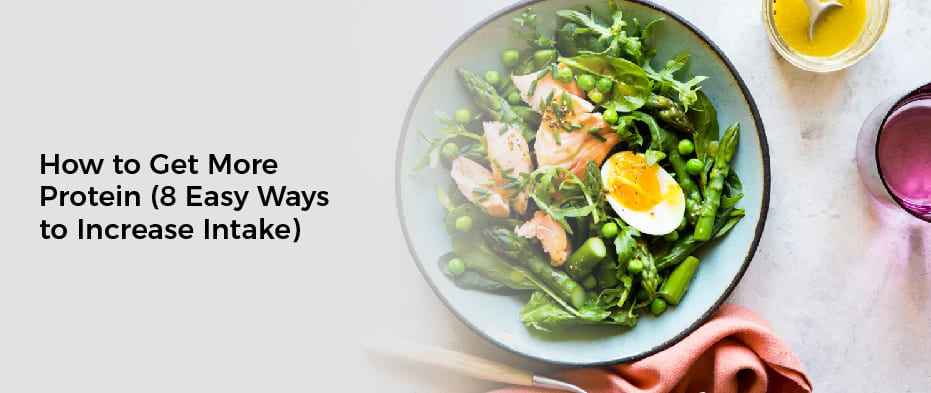Protein is an essential nutrient that plays a vital role in our overall health and well-being. It helps build and repair body tissues, provides energy, and supports healthy immune systems. But getting enough protein on a daily basis can be challenging for some people. If you’re looking to increase your protein intake, several options are available. Here are some tips on how to get more protein in your diet.
1. Eggs Protein
Besides being an excellent source of protein, eggs also offer a number of important vitamins and minerals. These include vitamins A, D, and B vitamins, as well as omega-3 fatty acids.
Eggs are also known to be rich in choline, which may help promote mental clarity. They also contain antioxidants, which protect your cells from free radical damage. It is also a great source of B vitamins, which help your body convert food to energy. They also provide iron, which helps maintain healthy cells.
2. Soybeans
Getting more protein from soybeans is not as difficult as it seems. There are two basic ways to do it. The first is fermenting the seeds, and the other is heat processing. Both methods improve the nutritional value of soybeans.
The most obvious way to get more protein from soybeans is to eat more whole soy products. Soymilk, edamame, tofu, and miso are all examples of whole soy products. These products are nutritious and can replace red meat and other foods high in saturated fat.
3. Edamame
Besides being a good source of protein, edamame is also rich in many antioxidants. They help flush out toxins and boost your immune system. This makes edamame an excellent addition to your diet. It also reduces inflammation and your risk of cardiovascular disease.
It is also rich in fiber, which helps keep your digestive system healthy. Fiber also helps reduce cholesterol levels. It is also an excellent iron source, promoting energy and preventinganaemia.
Edamame contains a large amount of potassium. This is needed for regulating your heartbeat and for normal cell function, andit is also needed for metabolizing carbohydrates.
4. Chia Seeds
Adding chia seeds to your diet is an excellent way to increase your protein intake. They are also a good source of omega-3 fatty acids, which can reduce the risk of heart disease. They are also good for your digestive health.
Chia seeds are a rich source of fiber. Fiber helps reduce digestive problems like bloating, constipation, and diarrhea. The fiber in chia seeds also helps keep you feeling fuller longer. It also contains a high amount of omega-3 essential fatty acids, known as alpha-linolenic acid. These fats are associated with lower rates of heart disease, stroke, and other cardiovascular problems.
5. Peanut Butter
Whether you’re a peanut butter fan or looking for a way to increase your protein intake, there are several ways to get the most out of it.
One of the best ways to get more protein from peanut butter is to make sure you get it in its natural form. Natural peanut butter has no added ingredients. It also should be low in salt and sugar. You can find natural peanut butter online or in a health food store.
6. Pork Chops Protein
Whether you’re eating the traditional chop or a more modern cut, you can get plenty of protein from pork chops. This lean meat cut is packed with vitamins, minerals, and nutrients.
Pork chops are easy to prepare. You can either cook them in your oven or a pan on the stove. If you’re using a pan, you’ll need to ensure it’s at a moderate heat, or you could dry them out.
If you cook your pork chops in the oven, you’ll find that they have less fat than the ones you’d get if you pan-fry them. This makes it a good choice for those who want to avoid frying or grilling pork.
7. Low-Fat Dairy
Whether you’re looking for ways to get more protein from low-fat dairy or avoid dairy altogether, there are plenty of healthy alternatives to consider. For instance, fortified dairy alternatives provide the same nutritional value as dairy without adding fat. These products are also a great option for people with digestive problems.
In addition to providing protein, dairy is an important source of calcium. It’s important to ensure you’re getting enough of the important mineral, which may reduce your risk of diabetes and cardiovascular disease.
8. Plant-Based Protein
Whether you are a vegetarian, vegan, or pescatarian, plant-based proteins can be an excellent way to meet your protein needs. If you’re unsure how to get enough protein, you can start by replacing your favorite foods with plant-based alternatives. Plant proteins are an inexpensive and healthy source of protein and can be found in various foods.
The latest studies suggest that plant-based nutrients can positively affect your health. For example, plant-based proteins may reduce your risk of developing cancer. They may also help improve your immune system. In addition, plant-based protein may have a lower environmental impact, which is a win for both you and the planet.

